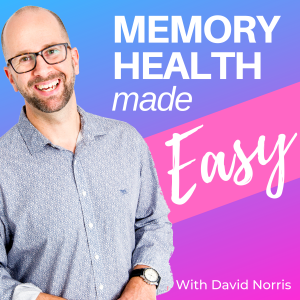
MHME 004: Do These Three (Plus) Areas of Your Life Need Attention Now?
 2020-01-28
2020-01-28
Cognitive decline is affecting more people every year. However, you can do a lot to keep your brain functions in top shape. People need to look at three aspects of their lives and see what they can do to optimise their brain health.
Welcome to the Memory Health Made Easy podcast. I’m your host, David Norris. In today's episode, I'll be tackling the three areas of your life related to cognitive function: physical activity, diet, and stress. You'll learn how to optimise each of these areas to keep your brain fit and healthy. You'll also learn about the importance of social connections. This aspect of your life can help you solidify the habits you need to protect your cognitive well-being.
Listen to this episode now and empower yourself with the steps you need to take to fight against cognitive decline.
How to Optimise Your Cognitive Function to Prevent Memory Loss The Rise of Dementia
- In 2015, 15 million people lived with dementia.
- The number of people struggling with dementia will double every 20 years.
- We might see more than 113 million people living with this disease by 2050.
- The total cost of dementia is 1 trillion USD, which will double in the next 10 years.
- Around 35 to 50% of people experience a subjective cognitive impairment.
- There are many ways to stave off memory problems and improve our brain fitness.
- You do not have to hit the gym to get the exercise you need, as long as your whole body is working out.
- Make sure to have both cardiovascular and resistance exercises throughout the week.
- Proper exercise encourages the formation of the brain-derived neurotrophic factor, which helps the brain adapt and change.
- Exercise improves the blood supply of the brain.
- Exercises requiring coordination adequately challenges the brain.
- If you haven't exercised for some time, start moving to raise your heart rate.
- If you have a medical condition, contact your local medical practitioner about your exercise plans.
- Diets rich in various colourful fruits and vegetables are full of phytonutrients that are essential for brain health.
- Get most of your fat intake from vegetables, nuts and seeds, but make sure that you get enough fat.
- Target 30 grams of protein per meal if you're under 65 years old, and consume enough energy sources such as carbohydrates and fats.
- As much as possible, avoid foods with additives such as pesticides, hormones or antibiotics.
- Try to adopt a diet close to the Mediterranean diet, which has powerful protective effects on the brain.
- Stress hormones damage the ability of the hippocampus to store and manage memories.
- While low amounts of stress are useful, chronic exposure can impact your cognitive fitness.
- Stress also interferes with sleep, an essential activity for maintaining brain health.
- Sleep deprivation, which can come from chronic stress, limits the ability of glial cells in the brain to remove wastes.
- Performing a particular exercise a few hours before you sleep can improve your memory by as much as 30%.
- Stress reduction techniques include taking breaks, slowing down and engaging in meditation practices.
- Aside from the three areas mentioned earlier, it's also essential to consider the richness of your social networks.
- The quality of your social interactions matters more than the quantity.
- A sound social support system allows you to sustain healthier habits like exercise, healthy diets and stress reduction.
If you have any questions or insights, please don’t hesitate to leave a review below to help us reach more people in starting a discussion about memory health. Subscribe to the podcast to stay in touch! Thanks for listening!
Grab a free copy of the Memory Health Toolkit today and start strengthening your brain building. You can reach me on my website and connect with me on LinkedIn or Twitter.
Disclaimer: The purpose of Memory Health Made Easy Podcast is to educate and to inform. It is no substitute for professional care by a doctor or qualified professional. This podcast is provided on understanding that it does not constitute medical or personal professional advice or services. Instead, we would encourage you to discuss your options with a health care provider who specializes in your particular needs.
More Episodes
Create your
podcast in
minutes
- Full-featured podcast site
- Unlimited storage and bandwidth
- Comprehensive podcast stats
- Distribute to Apple Podcasts, Spotify, and more
- Make money with your podcast
It is Free
- Privacy Policy
- Cookie Policy
- Terms of Use
- Consent Preferences
- Copyright © 2015-2024 Podbean.com






